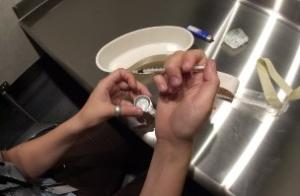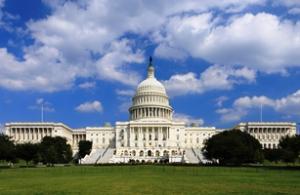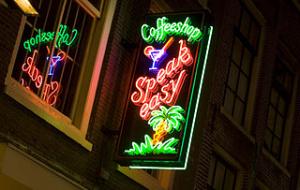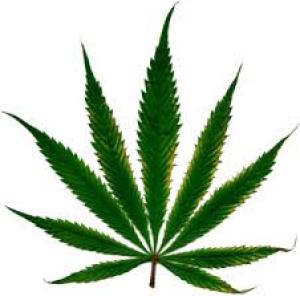Drug testing toddlers, felony ingestion charges, overcrowded jails and prisons, racial disparities -- South Dakota has it all.
Mexico's narco-clowns are no laughing matter.
A Georgia narc gets in trouble for his sticky fingers, a Philadelphia narc uses a confiscated Porsche for his stepdaughter's prom pictures, and more.
Marijuana arrests nationwide increased last year despite spreading legalization, a California psilocbyn decriminalization initiative has been filed, and more.
Los Angeles sees the nation's first legal cannabis cafe, the Arizona pot legalization initiative draws industry opposition, the Justice Department says DEA didn't adequately regulate opioid manufacturing, and more.
A federal judge hands a preliminary legal victory to proponents of a Philadelphia safe injection site, hundreds of cannabis industry figures call on Congress to deschedule marijuana as a means of grappling with the vaping crisis, and more.
The Trump administration allows states to demand drug tests for laid off workers seeking unemployment benefits, a Florida marijuana legalization initiative's signature gathering campaign is off to a fast start, and more.
Nevada sees its first "cannabis tasting room," a New York poll finds continuing support for marijuana legalization amidst the vaping scare, British drug policy upheavals, and more.
Mexico is moving rapidly toward marijuana legalization, Scotland's largest political party is set to embrace drug decriminalization, and more.
Two UN agencies report that US airstrikes on Afghan drug labs were illegal and killed civilians, a Michigan roadside drug testing pilot program has now gone statewide, and more.
HHS comes out with new guidelines for physicians on tapering patients off opioids, marijuana social equity advocates keep the pressure on Congress, Tulsi Gabbard calls for drug decriminalization, and more.
A new study deflates one of the leading worries of marijuana legalization foes, the state of Texas abruptly quits taking medical marijuana dispensary applications, and more.
California will see a batch of new marijuana-related laws, Scotland's largest political party calls for drug decriminalization, and more.
The vaping crisis has impelled two more states to restrict marijuana vaping products, Mexican cartel gunmen kill 14 police in a bloody ambush, and more.
A pair of Pennsylvania state senators have filed a marijuana legalization bill, the Mexican Senate prepares to vote on marijuana legalization, Amnesty International rips the Philippine drug war, and more.
At least five governors have marijuana on their minds this week, Canada allows marijuana edibles and vapes to go on sale, a South Carolina judge rules the state's civil asset forfeiture law unconstitutional, and more.
The head of the Senate Banking Committee wants some changes made to the SAFE Banking Act, Kansas' Douglas County ends pot prosecutions, the Sinaloa Cartel battles Mexican soldiers and police to free El Chapo's son, and more.
With endless miles of farmland shading into ever higher and drier terrain as one moves west, crossing the Missouri River and then on to the Badlands and the Black Hills, South Dakota has a certain austere beauty. Not so in its approach to drugs. When it comes to drug policy, it is one of the ugliest places in the country.

South Dakota's Badlands. The state is a pretty bad land for drug users, too. (Creative Commons)
The staunchly conservative state holds the dubious distinction of being the only state to twice defeat a medical marijuana initiative. (Activists are giving it another shot this year -- and a more wishful legalization initiative, too.) And it is being sued by the state ACLU over the
forced drug testing of toddlers and arrestees alike.
South Dakota also boasts the nation's only law making ingestion -- not possession -- of a controlled substance a felony, which helps explains the reflex resort to drug testing arrestees: A positive drug test becomes a prosecutable offense. While 10 other states have ingestion laws on the books, none of them makes it a felony.
And now, a new report from the Prison Policy Initiative finds that "South Dakota jails more people per capita than any other state," that almost "half of all arrests are drug or alcohol related, compared to just 29 percent nationally," and that people of color -- in this case, primarily Native Americans -- are disproportionately arrested at a rate far above the national average.
According to the report, South Dakota jailed 2,888 people per 100,000, nearly twice the national average of 1,506, and narrowly edging out Mississippi, which had 2,814 per 100,000. (Other states that jailed more than one out of 50 of their residents were Georgia, Kansas, Kentucky, New Mexico, Oklahoma, and Wisconsin.)
But jail is just the gateway to the incarceration complex, and when it comes to long-term stays behind bars, South Dakota displays the same sort of worrying numbers. According to the ACLU of South Dakota, the state's prison population has increased more than five-fold since 1980, a decade after the drug war began. And despite 2013 reforms designed to reduce the prison population, it stubbornly stays near an all-time high reached in 2017.
In fact, new prison admissions spiked upward by 49 percent between 2015 and 2018. These numbers are largely attributable to drug prosecutions, with nearly one in three prisoners doing time for drugs in 2019, up from one in four in 2014.
As the ACLU noted, "This increase was driven almost entirely by a rise in the number of people whose most serious offense was unauthorized ingestion of a controlled substance."
That's right -- South Dakota is spending millions of dollars to incarcerate people not for drug dealing, not even for drug possession, but for having used drugs and still having traces of them in their system.
And it's doing so in an alarmingly racially disproportionate manner. Native Americans make up only 7 percent of the state's population but constitute nearly one-third (31 percent) of the state prison population. Similarly, the state has a tiny African American population (2 percent), but black South Dakotans made up 8 percent of the prison population. The imprisonment rate for both African Americans and Native Americans was seven times that of the state's overwhelmingly white population. For the state's Latino population, the imprisonment rate was twice that of whites.
In a press release last month, the state ACLU reported that it's just as bad in the state's jails, with Native Americans making up roughly half of all jail admissions and accounting for the majority of all drug- and alcohol-related arrests in the state. The group noted that "Native Americans between ages 15 and 64 are incarcerated at 10 times the rate of white people in South Dakota."
"It's time to come to terms with the significant racial disparities that are so ingrained in our criminal legal system," said Libby Skarin, ACLU of South Dakota policy director. "This is not something that can be mitigated by solely reducing the number of arrests in South Dakota. Our elected officials need to acknowledge the realities of these racial disparities and commit to tackling them head-on."
State leaders grasp that there is a problem here. The state legislature has set up an interim study group to examine the state's approach to drug offenses, which met for the first time in August. The group includes legislators, law enforcement, court administrators, the South Dakota attorney general and the secretary of the Department of Corrections, but not public health officials or actual drug users.
The panel heard even more disturbing numbers about drug prosecutions. There were 2,104 people convicted of drug possession statewide so far this year, a more than four-fold increase from 2009, even though drug use levels have remained relatively stable over that period. That is leading panel members to wonder about the role of local prosecutors in generating such large increases in prosecutions.
"Though drug use is undoubtedly a serious issue, we can't incarcerate our way out of addiction," said the ACLU's Skarin. "The enormous amount of money South Dakota spends on jailing people for drug-related offenses is disproportionate and causes more harm than good to individuals struggling with addiction, their families and their communities."
It is for this reason that the ACLU says it is supporting initiatives such as "reclassifying ingestion as a misdemeanor."
Skarin explained, "Reclassifying ingestion as a misdemeanor and investing the resulting savings of state funds in diversion and treatment programs designed to combat addiction would go a long way in helping to solve the underlying problems leading to drug abuse."
Pennington County (Rapid City) public defender Eric Whitcher is on the same page as the state ACLU. He told the interim panel that 73 of his last 100 drug possession cases involved only trace or immeasurable amounts of drugs and that if such cases were not charged as felonies, his office could operate with significantly fewer felony prosecutors.
"We are an outlier," said Whitcher, speaking about South Dakota. "We are creating more felonies for the same conduct than our neighboring states. What impact does that have on their lives?"
Dropping ingestion from a felony to a misdemeanor would be a step in the right direction, but it's an awfully small step. South Dakota has a long, long way to go to get on the right side of drug policy, and no natural beauty can hide that.
back to top
Move over, Joker. Step aside, Pennywise. And get back behind the curtain, Giuliani. There's some real-life killer clowns patrolling the streets down Mexico way, and they've got video to prove it.
According to local media reports from Tamaulipas state, just across the Rio Grande River from Brownsville and Harlingen, Texas, soldiers for a major drug trafficking organization, the Jalisco New Generation Cartel (CJNG), and their local affiliate, Los Metros, posted a series of bragging videos in recent weeks.
Unlike too many other Mexican cartel videos that depict horrendous violence, torture, and murder (usually inflicted on rival gang members, cops, or common criminals), these videos show no savage bloodletting. But this video of cartel members wearing clown masks, waving around weapons, and generally having a good time is still downright creepy and disturbing.
See for yourself:
Clown masks notwithstanding, these guys are no laughing matter. In recent years, the CJNGC has emerged as a major player among Mexico's drug cartels and is now the leading challenger to the remnants of Joaquin "El Chapo" Guzman's Sinaloa Cartel. Under the leadership of Nemesio "El Mencho" Oseguera Cervantes, the CJNG is responsible for sending tons of cocaine, meth, and fentanyl-laced heroin to the US and, according to the Justice Department, accounts for one-third of all illicit drugs being imported to the US.
As InSight Crime has noted, the CJNG emerged out of bloody intra-cartel battles for control of the lucrative drug trade" and has been associated with the use of extreme violence." Under the rubric of Matazetas (Kill Zetas), it moved into Zetas territory in the northeast of Mexico, claiming responsible for the massacre of 35 people in Veracruz in 2011.
In 2015, the CJNG raised its profile with a spectacular attack on police in Jalisco, killing 15 officers. The following month, it shot down a Mexican military helicopter, leaving five soldiers dead. Since then, the JNGC has continued on its bloody path to power and wealth, now operating in at least 22 Mexican states, with assets valued at around $20 billion.
The vast bulk of that money is coming from American drug buyers who, under a prohibition regime, are directly financing the JNGC and all the other groups involved in Mexico's delinquencia organizada. In that sense, the cartels are less killer clowns than the Frankenstein's monster of drug prohibition.
back to top
A Georgia narc gets in trouble for his sticky fingers, a Philadelphia narc uses a confiscated Porsche for his stepdaughter's prom pictures, and more. Let's get to it:
In Lawrenceville, Georgia,
a former Gwinnett County deputy was arrested last Wednesday for allegedly using his position on a federal narcotics task force to steal cocaine and methamphetamine. Antoine Riggins faces federal charges of stealing cocaine and methamphetamine, as well as multiple counts of making false statements to cover up his thefts. Riggins was assigned to transport seized drugs to the evidence vault but would repeatedly take some for himself.
In Philadelphia, a Philadelphia police narcotics officer was arrested last Thursday for using a 2018 Porsche he confiscated during a drug investigation to drive his stepdaughter to take photos for her school prom. James Coolen Jr., 45, is charged with unauthorized use of an automobile and misapplication of entrusted property, both second-class misdemeanors. He resigned from the department last Wednesday to avoid being fired.
In Senath, Missouri, a Senath police officer was arrested last Friday after a traffic stop turned up meth, drug paraphernalia, and a bunch of guns. Officer Freddie Williams, 38, faces one count of class C felony possession of a controlled substance with intent to distribute and nine counts of class E felony unlawful use of a weapon. Williams is also the former police chief in Cardwell, Missouri.
In Springville, Alabama, a St. Clair Correctional Facility guard was arrested Tuesday after a work vehicle search found 138 grams of methamphetamine and 16 grams of heroin in his car as he came to work. Ivan Caldwell, 26, is charged with two counts of trafficking in controlled substances, promoting prison contraband, and violation of license to carry a pistol. He has resigned as a correctional officer.
back to top
Marijuana arrests nationwide increased last year despite spreading legalization, a California psilocbyn decriminalization initiative has been filed, and more.

Cocaine. Peru's potential cocaine production "remains elevated," the drug czar's office said.
Marijuana Arrests Increased Again Last Year Despite More States Legalizing, FBI Data Shows. According to the FBI's annual Uniform Crime Reports released Monday, the number of marijuana arrests in the US last year was 663,367, a slight increase over the 659,700 pot arrests tallied in 2017 and the 653,249 tallied in 2016. This despite the fact marijuana is now legal for adults in 11 eleven states and medical marijuana is legal in 33 states. Before 2016, marijuana arrests had been declining for roughly a decade.
Psychedelics
California Psilocybin Decriminalization Initiative Filed. A group of activists calling itself Decriminalize California has filed a psilocybin decriminalization initiative with state officials. The group has submitted ballot language to the attorney general's office and is now awaiting approval for an official title and summary. Once that is completed, activists will have 180 days to come up with 625,000 valid voter signatures to qualify for the November 2020 ballot. The initiative would decriminalize "personal possession, storage, use, cultivation, manufacturing, distribution in personal possession amounts without profit, transport, and consumption of psilocybin mushrooms" by individuals 18 and older.
International
ONDCP Releases Data on Coca Cultivation and Production in Peru. On Tuesday, the White House Office of National Drug Control Policy (ONDCP) released the results of the annual US Government estimates measuring coca cultivation and potential cocaine production for the Republic of Peru. The estimates found that cultivation "remained elevated" at more than 125,000 acres, up slightly from 2016 and 2017, but still below the recent record of about 180,000 acres in 2013. "The ongoing coca cultivation in Peru and across the Andean Region of South America remains a significant threat to the United States. As part of the Trump Administration's whole-of-government approach to the addiction crisis, we will continue to support our partners in Peru to curb cultivation and production in critical growing regions. We are committed to bringing those who profit off the international drug trade to justice to help accomplish our goal of saving lives," ONDCP Director Jim Carroll said.
back to top
Los Angeles sees the nation's first legal cannabis cafe, the Arizona legalization initiative draws industry opposition, the Justice Department says DEA didn't adequately regulate opioid manufacturing, and more.

Ayahuasca-inspired art. The Dutch Supreme Court has ruled the substance illegal. (Pinterest)
Senators Introduce Federal Student Financial Aid Bill. US Sens. Jeff Merkley (D-OR) and Ron Wyden (D-OR) announced new bipartisan legislation Tuesday they say would allow students with a felony drug conviction access to the American Opportunity Tax Credit for higher education. The Eliminating Discrimination and Creating Corridors to Expand Student Success Act of 2019 (ED ACCESS Act) would fix this inequity by repealing the lifetime ban. The measure does not yet have a bill number.
Arizona Legalization Initiative Campaign Draws Industry Opponents. A new marijuana industry group has formed to fight the Smart and Safe Arizona Act, which itself is backed by other industry groups. The new group calls itself the Arizona Cannabis Chamber of Commerce and has its own ideas about what legalization should look like. The group complains that the initiative is tailored to the needs of existing dispensary owners, that there wouldn't be enough licenses available, and that the proposed 16% sales tax rate is too high.
Pennsylvania Bill Filed to Legalize via State-Run Model. State Rep. David Delloso (D) on Monday filed a bill that would legalize marijuana and allow adults 21 and older to possess, consume, cultivate and purchase marijuana through a state stores system run by the Liquor Control Board. Retail pot shops would be taxed at 19%, and all of that revenue would go toward the state general fund. The bill would also create a distinct regulatory scheme for industrial hemp. The bill is not yet available on the state legislative web site.
Tennessee Steps Back from Marijuana Enforcement. The Tennessee Bureau of Investigation has announced that it will no longer test amounts of marijuana less than a half ounce, making it virtually impossible for prosecutors to build a case against small-time possessors.
Nation's First Cannabis Café Opens in Los Angeles. The first-ever licensed cannabis café in the US has opened in Los Angeles. The Lowell Café opened its doors to the public in West Hollywood on Tuesday. The café is a hybrid marijuana lounge and restaurant where you can order some weed along with your meal.
Heroin and Prescription Opioids
Justice Department Says DEA Failed to Properly Regulate Opioids. In a new report from the agency's inspector general, the Justice Department found that the DEA fell short in regulating the supply of prescription opioids in the past two decades. The agency continued to raise manufacturing quotas for opioids with little regard to oversupply or misuse, the report found. The DEA "ill-equipped to effectively monitor ordering patterns for all pharmaceutical opioids, which could enable the diversion of these prescription drugs and compromise public safety." Although alarm bells were already ringing by the turn of the century, the DEA allowed manufacturing levels of oxycodone -- sold as OxyContin by Purdue Pharma -- to nearly quadruple between 2000 and 2013.
International
Dutch Supreme Court Rules Ayahuasca Illegal. The Dutch Supreme Court ruled Tuesday that ayahuasca falls under the country's hard drug laws and that its import is illegal. The ruling came in the case of a woman who had imported about 70 pounds of ayahuasca tea from Brazil for use in Santo Daime church rituals. Because the substance contains DMT, which is covered by Dutch drug laws, ayahuasca is covered as well.
Mexican Marijuana Legalization Bill Would Create State-Run System. Diputado Mario Delgado Carrillo, coordinator of the ruling MORENA Party's bench in the Chamber of Deputies, filed a bill Tuesday that would legalize marijuana through a government-run system. Under the bill, a regulatory body called Cannsalud would be in charge of the legal market, which would be the "exclusive property of the federal government, with a technical, operational and management autonomy for the realization of its primary purpose" to create a legal, regulated system. "With this, the cannabis market is not left to autonomous regulation by individuals, but the state is involved as a constant supervisor and controller of the activity of this substance within a margin of legality that guarantees a benefit for all," Delgado said. "This is a first step towards the opening of a new lawful market, and a public company is proposed as an obligatory intermediary in order to identify and contain the risks inherent in the establishment of a new market, when there are already international commercial interests that seek to maximize its utilities above the protection of people's health," he said.
back to top
A federal judge hands a preliminary legal victory to proponents of a Philadelphia safe injection site, hundreds of marijuana industry figures call on Congress to deschedule marijuana as a means of grappling with the vaping crisis, and more.

At the InSite safe injection site in Vancouver. Could a similar facility be coming to Philadelphia? (vch.ca)
Hundreds of Marijuana Companies Sign Letter Calling for Descheduling to Prevent Vaping Injuries. Some 800 marijuana industry executives have signed onto a letter to Congress calling on that body to deschedule marijuana as a means of reducing the risks of vaping black market marijuana products. The letter was delivered to Congress Thursday.
Massachusetts Sued Over Marijuana Vaping, E-Cig Ban. The Vapor Technology Association, a national vaping industry trade organization, has filed suit in federal court seeking to block the state's recently instituted four-month ban on sales of marijuana vapes as well as e-cigarettes. Massachusetts last month became the first state to ban the sale of marijuana and tobacco vaping products.
Drug Policy
Majority of Americans Support Decriminalizing All Drugs, Poll Finds. A new poll from the libertarian-leaning Cato Institute finds a majority support decriminalizing all drugs. The poll of 1,700 adults found that 55% would rather treat drug offenses as infractions than as criminal offenses, with 44% opposed. Among Democrats, 69% favored decriminalization; among independents, 54%; among Republicans only 40%.
Harm Reduction
Federal Judge Rules Proposed Philadelphia Safe Injection Site Doesn't Violate Federal Law. US District Judge Gerald McHugh ruled Wednesday that a nonprofit group's plan to open a safe injection site in Philadelphia does not violate federal law. The judge ruled that the "crack house" provision of the Controlled Substances Act does not apply to the group's bid to assist opioid users. "No credible argument can be made that facilities such as safe injection sites were within the contemplation of Congress" when that body wrote the law in 1986 or amended it in 2003, McHugh wrote. "I cannot conclude that Safehouse [the safe injection site] has, as a significant purpose, the objective of facilitating drug use. Safehouse plans to make a place available for the purposes of reducing the harm of drug use, administering medical care, encouraging drug treatment and connecting participants with social services."
back to top
The Trump administration allows states to demand drug tests for laid off workers seeking unemployment benefits, a Florida marijuana legalization initiative's signature gathering campaign is off to a fast start, and more.

Coca production is spiking along the Peru-Bolivia border. (dea.gov)
Florida Legalization Initiative Already Has 100,000 Signatures. Make It Legal Florida, the group behind one of two state marijuana legalization initiatives, is fast out of the gate. The group reported that it has gathered 100,000 raw signatures in the first 20 days of signature gathering. According to state law, a petition must undergo a Florida Supreme Court review before it can even be considered, and that can be done only after 76,632 valid voter signatures have been collected. To actually qualify for the 2020 ballot, the group will need 766,000 valid voter signatures by February.
Drug Testing
Trump Administration Okays Rule Allowing States to Demand Drug Tests for Unemployment Benefits. The Department of Labor published a new rule Friday that will allow states to force more laid off workers to submit drug tests in order to receive benefits. The move reverses Obama administration policies, and allows states to demand drug tests from laid off workers who work for companies that normally require job applicants to pass drug tests.
California Governor Vetoes Bill to Expand Drug Testing in Fatal Traffic Accidents. Gov. Gavin Newsom (D) has vetoed Assembly Bill 551, which would have required drug tests to be performed after every fatal accident in the state. State law already requires mandatory testing for alcohol. The bill had passed unanimously in both houses, but Newsom said that county coroners already had the authority to conduct drug testing.
International
Coca Crops Surge Amid Security Vacuum on Peru-Bolivia Border. Coca planting is spiking near a national park on the Bolivia-Peru border, with nearly 25,000 acres of plantings reported this year, a fourfold increase from 2017. The local coca boom is causing a dramatic population increase in the area, which suffers from disintegrating security and a shift in cocaine smuggling from Bolivia from airplanes to moving drugs by land.
back to top
Nevada sees its first "cannabis tasting room," a New York poll finds continuing support for marijuana legalization amidst the vaping scare, British drug policy upheavals, and more.

Diacetylmorphine (prescription heroin) will be provided to hardcore addicts in a British pilot program. (Creative Commons)
Nevada's First Marijuana Lounge is Now Open. The state's first marijuana tasting room opened this weekend in Las Vegas. The Las Vegas Pauite Tribe is operating the NuWu Cannabis Marketplace on tribal land, which gives it a leg up on potential competitors. Under a state law signed in June, local governments are barred from licensing marijuana consumption lounges until 2021, but tribal lands are not subject to the law.
New York Sienna Poll Has Continuing Support for Legalization, Even as Vaping Fears Grow. A new Sienna poll has support for marijuana legalization in the Empire State at 56%, even as nearly as many respondents (52%) support banning all e-cigarettes and vaping devices from sale. An even higher number, 61%, support Gov. Andrew Cuomo's emergency executive order banning the sale of flavored e-cigarettes. Half, 52 percent, have used marijuana and 21 percent currently do.
Medical Marijuana
Missouri Patients Won't Lose Welfare Over Medical Marijuana Use. After patients complained that their medical marijuana use put them at odds with a state law that requires welfare recipients to be screened for drug use, the state has revamped its policy. Department of Social Services spokeswoman Rebecca Woelfel said that the agency now exempts recipients with medical marijuana cards.
International
British Drug Advisory Panel Member Quits, Cites Political Interference. Professor Alex Stevens, a senior member of the Advisory Council on the Misuse of Drugs (ACMD), has resigned over the alleged "political vetting" of panel members by the government. The move comes after then crime minister Victoria Atkins blocked the appointment of Niamh Eastwood, the executive director of the drug policy nonprofit Release, after finding that she had previously criticized the Home Office and called for drug policy reform. Stevens said there was at least one other case of people being denied a place on the ACMD because of criticizing government drug policy. "I have resigned because of my concerns over the political vetting of potential members of the ACMD," Stevens said. "The political vetting fundamentally undermines the independence of the council," Stevens added. "It is supposed to be protected by the working protocol between the home secretary and the ACMD. This does not seem compatible if ministers exclude those who disagree with them."
British Government Replaces Minister Responsible for Drug Policy. Victoria Atkins, who had been responsible for drug policy for the Conservative Party, was quietly replaced in that position over the summer. She was replaced as minister of state for policing, crime, and fire services by Kit Malthouse, but it had been believed Atkins kept the drug portfolio. But on Monday, Malthouse's office confirmed he was now responsible for drug policy. He has recently been speaking for the government on drug policy issues and laying out a hard line against opening safe injection sites.
British Police Force to Begin Giving Free Heroin to Select Addicts. The police force in Cleveland, North Wales, will begin a program to provide free heroin to a small group of hardcore addicts. They will be provided with injectable pharmaceutical grade heroin at a National Health Service clinic three times a day. The idea is to reduce crimes committed by people seeking money to pay for their medications. Cleveland Police and Crime Commissioner Barry Coppinger said the program would be available for heroin users "for whom all other treatment has failed and who are known to be the most active criminals in the town as they look to finance their addiction."
back to top
Mexico is moving rapidly toward marijuana legalization, Scotland's largest political party is set to embrace drug decriminalization, and more.

Mexico's congress is set to vote on a marijuana legalization bill this month. (Creative Commons)
Massachusetts Governor, Cops Push High Driving Bill. Gov. Charlie Baker (R) on Monday pushed for passage of his administration's impaired driving bill. Introduced earlier this year, the bill aims to make it easier for law enforcement to crack down on people driving under the influence of marijuana. The bill would allow police to seek electronic search warrants and punish drivers who refuse drug tests. It would also bar open or loose pot packages in vehicles. Law enforcement officials who appeared with Baker also supported the bill.
Medical Marijuana
Pennsylvania ACLU Sues County for Prohibiting Probationers from Using Medical Marijuana. The ACLU of Pennsylvania has filed a lawsuit against Lebanon County's policy prohibiting people who are on probation and who are registered medical marijuana patients from using their medication. The action will take the form of a class action lawsuit involving more than 60 people in the county who are on some form of community supervision and are medical marijuana patients. Although medical marijuana has been legal in the state since 2016, a Lebanon County judge ruled that medical marijuana is still illegal at the federal level, and county officials used that rationale to institute the policy. "The plain language in the medical marijuana law shows that the legislature intended to protect all patients, including those on probation," said Witold Walczak, legal director of the ACLU of Pennsylvania. "Judges may not agree with the Medical Marijuana Act or may not support people using marijuana for any reason, but they must follow the law."
International
Mexico Senate Leader Says Lawmakers Will Vote on Marijuana Legalization by Month's End. Sen. Ricardo Monreal, Senate leader of the ruling MORENA Party, said Monday that the Senate is just about done crafting a marijuana legalization bill after weeks of public forums and open-session debates and that a vote would come soon. "We're thinking that we'll bring the law out, approve it, at the end of October," Monreal said. "That's the schedule we have."
Scottish National Party Set to Back Drug Decriminalization. Scotland's largest political party, the Scottish National Party (SNP) is set to adopt a platform plank calling for drug decriminalization. The move to support relaxing laws against possession and consumption of drugs is expected to be passed at the party's annual conference in Aberdeen this weekend. The move comes as the country grapples with an overdose death crisis.
back to top
Two UN agencies report that US airstrikes on Afghan drug labs were illegal and killed civilians, a Michigan roadside drug testing pilot program has now gone statewide, and more.

A Michigan pilot roadside drug testing program has now gone statewide. (Creative Commons)
Michigan Roadside Drug Testing Program Now Statewide. A pilot program to test drivers for a range of illicit drugs has now gone statewide, the Michigan State Police have announced. The program had been underway in five counties for the past year. It uses check swab tests to detect the presence of amphetamines, benzodiazepines, cannabis (delta 9 THC), cocaine, methamphetamines and opiates. During that first year, police arrested 89 people for impaired driving based on the test, most of them for marijuana.
Hemp
South Dakota Lawmakers Move to Legalize Hemp Over Governor's Objection. A legislative Hemp Study Committee met Monday to begin writing a bill to legalize hemp next year over the objections of Gov. Kristi Noem (R). The legislature passed a hemp bill last year, only to have Noem veto it, citing difficulties for law enforcement and fears it was a stalking horse for marijuana legalization. One issue for legislators now is whether to include CBD in hemp legalization.
Foreign Policy
UN Says US Airstrikes on Afghan Drug Labs Unlawful, Killed Civilians. A United Nations report Wednesday found that US airstrikes on Afghan drug labs killed or wounded at least 39 civilians, violating international humanitarian law since the victims were non-combatants. The UN Assistance Mission in Afghanistan and the UN Human Rights Office jointly issued the report. "UNAMA has assessed that the personnel working inside the drug production facilities were not performing combat functions," the report said. "They were therefore entitled to protection from attack, and could only have lost this protection if, and for such time, as they had been directly participating in hostilities."
back to top
HHS comes out with new guidelines for physicians on tapering patients off opioids, marijuana social equity advocates keep the pressure on Congress, Tulsi Gabbard calls for decriminalization of drug use, and more.

Marijuana social equity organizations are keeping the pressure on Congress to not stop with merely a banking bill. (CC)
. The Leadership Conference on Civil and Human Rights, representing more than 200 organizations, sent a letter to lawmakers Tuesday calling on lawmakers to cosponsor a bill that would remove marijuana from the Controlled Substances Act. That bill is the Marijuana Opportunity Reinvestment and Expungement (MORE) Act (HR 3884), filed by Judiciary Committee Chair Jerrold Nadler (D-NY). The letter comes as the Leadership Conference says earlier passage of a marijuana banking bill wasn't enough. That bill was "an incremental step toward rolling back the federal war on marijuana," but that "it lacks provisions to help communities that have been historically and disproportionately devastated by United States' punitive drug laws," the letter said.
California Awards Cities $10 in Social Equity Marijuana Grants. The state Bureau of Cannabis Control has awarded $10 million to 10 cities to help build social equity programs. The two biggest recipients are Los Angeles and Oakland, which will split $3.5 million.
Drug Policy
Tulsi Gabbard Suggests Decriminalizing Drugs Like Cocaine and Heroin. Democratic presidential contender Rep. Tulsi Gabbard (D-HI) suggested in an interview Tuesday that she would support the legalization of drugs such as cocaine and heroin. When asked whether sales of such substances should be illegal, she said removing criminal penalties for users is "the direction that we need to take while still criminalizing those who are traffickers and dealers of these drugs."
Sentencing Policy
California Governor Signs Sentencing Reform Bill. Gov. Gavin Newsom (D) has signed into law the RISE Act (SB 136), which removes a sentencing enhancement that added an extra year to an individual's base sentence for each of their prior prison or felony jail terms.
Heroin and Prescription Opioids
New Federal Guidelines on Tapering Tell Doctors to Go Slow. The Department of Health and Human Services (HHS) has issued new guidelines for doctors on how, when, and whether to taper opioid-using patients off the drugs. The main thrust of the new guidelines is that doctors should be slow, cautious, and deliberate in reducing dosages and that they should consult with patients about how they are tolerating the process. The guidelines come after years of reaction to the prescription opioid crisis that resulted in a severe tightening of access to opioid pain medication. Many chronic pain patients and others have complained that they can no longer receive sufficient opioids for their medical needs.
International
Panama Lawmakers Debate Legalizing Medical Marijuana. Two years into a legislative effort to legalize medical marijuana, the congressional Commission on Work, Health, and Social Development took up the measure Wednesday. It still faces several legislative hurdles before becoming law. If it does, it would become the first Central American country to do so.
(This article was prepared by StoptheDrugWar.org's 501(c)(4) lobbying nonprofit, the Drug Reform Coordination Network, which also pays the cost of maintaining this website. DRCNet Foundation takes no positions on candidates for public office, in compliance with section 501(c)(3) of the Internal Revenue Code and does not pay for reporting that could be interpreted or misinterpreted as doing so.)
back to top
A new study deflates one of the leading worries of marijuana legalization foes, the state of Texas abruptly quits taking medical marijuana dispensary applications, and more.
Marijuana PolicyStudy Finds No Significant Change in Post-Legalization Crime Rates. A new study published by Justice Quarterly suggests that recreational marijuana legalization did not have a statistically significant impact on violent and property crime rates in Colorado and Washington. Researchers from Washington and Colorado compared pre- and post- legalization crime rates in those two states with the crime rates in 21 states "that have not legalized marijuana use for recreational or medical purposes on a large scale." They found that there was an immediate increase in property crime rates in both states, and aggravated assault rates in Washington, but those changes did not persist.
Medical Marijuana
California Governor Signs Bill Allowing Medical Marijuana at School. Gov. Gavin Newsom (D) has signed into law a bill that will allow parents in some school districts to bring medical marijuana to school for their children who are medical marijuana patients. The bill only allows the in-school use of non-smokeable and non-vapable forms of marijuana. Former Gov. Jerry Brown (D) vetoed a similar bill last year.
Texas Abruptly Halts Permitting Process for New Medical Marijuana Dispensaries. Only a week after opening the application process for medical marijuana dispensaries, the state Department of Public Safety has suddenly suspended it. "The Department's Compassionate Use Program is not accepting applications at this time," it says on the department web site. The sudden announcement comes nearly a month after the state said it would keep the application process open for a month, from Oct. 1 through Nov. 1. The department did not explain why it stopped accepting applications.
back to top
California will see a batch of new marijuana-related laws, Scotland's largest political party calls for drug decriminalization, and more.

Amsterdam cannabis cafe (Creative Commons)
California Governor Signs Marijuana Tax Fairness Bill but Vetoes Cannabis in Hospitals. Gov. Gavin Newsom (D) has signed into law a number of marijuana-related bills, including one -- AB 37 -- that will let state-legal businesses use more tax deductions, but he vetoed a bill that would have allowed patients to use medical marijuana in hospitals and other health care facilities.
Anchorage, Alaska, to Vote on Allowing Cannabis Cafes. The Anchorage Assembly voted last week to let voters decide whether the city should allow people to smoke pot in retail locations around town. The question will be on the April 7, 2020, municipal ballot.
International
Philippines National Police Chief Resigns Amidst Drug Scandal. Gen. Oscar Albayalde, chief of the Philippines National Police, has stepped down amidst allegations that he intervened as a provincial police chief to prevent his officers from being prosecuted for allegedly selling a huge quantity of seized drugs. The National Police have led enforcement of the Philippines' bloody drug war.
Scottish National Party Formally Endorses Drug Decriminalization. Scotland's largest political party has formally endorsed the "decriminalization of possession and consumption of controlled drugs," and called on the British government to allow Scotland to make drug policy decisions for itself. The resolution was introduced at the party's annual convention, and passed unanimously.
back to top
The vaping crisis has impelled two more states to restrict marijuana vaping products, Mexican cartel gunmen kill 14 police in a bloody ambush, and more.

Hydrocodone. Pain patients are complaining over DEA cuts to opioid production quotas, but DEA is sanguine. (Creative Commons)
Colorado Regulators Prepare Ban on Certain Additives in Marijuana Vape Products. The state's Marijuana Enforcement Division has proposed final rules on vaping products that will ban a set of additives for those products. The move comes amidst the emergence of a mysterious lung disease linked to e-cigs and marijuana vape pens. The proposed prohibitions in ingredients used in marijuana concentrates or products intended for inhalation include: Polyethylene glycol (PEG); Vitamin E Acetate; and Medium Chain Triglycerides (MCT Oil) -- all of which are used to thin THC oil so it can be atomized or vaporized.
Oregon Bans Flavored Marijuana Vaping Products for Six Months. Oregon has now imposed a six month ban on flavored marijuana vaping products, becoming the third state to impose a form of ban on such products since the vaping crisis unfolded. Gov. Kate Brown (D) had issued an executive order on October 4 banning the sale of all flavored vaping products; state officials filed rules last Friday putting the order into effect. The move comes after nine people fell ill in the state, with five of them having bought marijuana products in licensed stores.
Heroin and Prescription Opioids
DEA Swats Away Pain Patient Complaints About Reduced Opioid Production Levels. Hundreds of chronic pain patients have implored the DEA to reconsider its proposed cuts to opioid production, which would reduce production quotas for popular opioids for the fourth year in a row, but the agency is just shrugging its shoulders. The cuts should have no impact on decisions made by doctors and "legitimate pain patients," the DEA said. "The agency does not regulate the practice of medicine. We do not get between a doctor and his or her patient," a DEA spokesperson said. "We also want legitimate pain patients, their families and caregivers to know that DEA does not seek to limit or take away their vital prescriptions."
International
Mexican Cartel Gunmen Ambush Police, Killing More than a Dozen. Gunmen of the Jalisco New Generation Cartel (CJNG) ambushed a police convoy in the western state of Michoacan on Monday, killing 14 police officers in one of the bloodiest attacks on security forces since President Andres Manuel Lopez Obrador took office. Photos from the scene showed burning police videos, the bodies of slain officers, and placards signed "CJNG" warning police not to support rival crime groups, such as Los Viagras.
back to top
A pair of Pennsylvania state senators have filed a marijuana legalization bill, the Mexican Senate prepares to vote on marijuana legalization, Amnesty International rips the Philippine drug war, and more.

Andrew Yang and Beto O'Rourke both came out in support of drug decriminalization at Tuesday night's debate. (CNN screen grab)
Colorado Officials Move to Ban Three Marijuana Vaping Additives. The Marijuana Enforcement Division held a public hearing Tuesday as its moves to finalize a ban on three additives in marijuana vaping products that have been linked to the outbreak of lung illnesses among vapers. Those additives are Polyethylene glycol (PEG), Vitamin E Acetate, and Medium Chain Triglycerides (MCT Oil). The proposed rules will be sent to the State Licensing Authority for approval and signature. Provided the changes are approved, they would go into effect on January 1.
Pennsylvania Senators File Marijuana Legalization Bill. State Sens. Daylin Leach (D) and Sharif Street (D) have filed SB 350 to legalize marijuana. Under the bill, anyone 21 or over could consume the substance, consumption lounges would be allowed, and people would be allowed to grow up to 10 plants at home as long as they register and pay a $50 annual fee. Similar legalization legislation has already been introduced in the House.
Drug Policy
Two Presidential Candidates Voice Support for Drug Decriminalization at Democratic Debate. Democratic presidential contenders Andrew Yang and Beto O'Rourke both came out in favor of decriminalizing opioids during the Democratic debate Tuesday night. "We need to decriminalize opioids for personal use. We need to let this country know this is not a personal failing, this was a systemic government failing," Yang said in response to a panelist's question. "Then we need to open up safe consumption and safe injection sites around the country because they save lives." When O'Rourke was asked whether decriminalization is part of the solution to the opioid crisis, he responded: "Yes it is. For many of the reasons that Mr. Yang just described."
Foreign Policy
White House Extends Long-Lived National Emergency on Colombia Drug Trafficking. President Trump has continued a 1995 executive order declaring a national emergency regarding Colombian drug trafficking for another year. "The actions of significant narcotics traffickers centered in Colombia continue to threaten the national security, foreign policy, and economy of the United States and cause an extreme level of violence, corruption, and harm in the United States and abroad," he wrote in his notice. "Therefore, in accordance with section 202(d) of the National Emergencies Act (50 U.S.C. 1622(d)), I am continuing for 1 year the national emergency with respect to significant narcotics traffickers centered in Colombia declared in Executive Order 12978."
International
Mexico Senate Could Vote on Marijuana Legalization in Next Few Days. A key lawmaker has told Reuters the Senate will vote on a bill to legalize marijuana in the next few days. Sen. Ricardo Monreal, the Senate leader for the ruling MORENA Party, said the bill would regulate personal use and marijuana sales, as well as research into the plant. The bill also contemplates the creation of marijuana growing cooperatives. "The end of the prohibitionist policy is good for the country," Monreal said. Under a Mexican Supreme Court ruling, the government has until October 24 to legalize marijuana. If and when the measure passes the Senate, it then goes to the House, which is also controlled by the MORENA Party.
Philippine Drug War Should End Following Police Chief's Resignation, Amnesty International Says. Philippines National Police head Gen. Oscar Albayalde was forced to resign over corruption in the National Police, the lead agency prosecuting the country's bloody drug war, and now Amnesty International is calling for that campaign to end. Nicholas Bequelin, Amnesty International's Regional Director for East and Southeast Asia, said: "General Albayalde's resignation is the last blow to the credibility of the so-called 'war on drugs'. The Philippines authorities must ensure that justice is done and that this lawless and murderous campaign ends now. President Duterte has said that due process of law will be afforded to Albayalde -- the very rights that his government has denied to thousands of people suspected of using or selling drugs, who have been unlawfully killed by the police acting as judge, jury and executioner. This scandal shows that impunity is entrenched in the institutions supposed to uphold human rights and the rule of law. The authorities must urgently expand their probe into General Albayalde to cover the wide-ranging police abuses that continue up to this day."
(This article was prepared by StoptheDrugWar.org's 501(c)(4) lobbying nonprofit, the Drug Reform Coordination Network, which also pays the cost of maintaining this website. DRCNet Foundation takes no positions on candidates for public office, in compliance with section 501(c)(3) of the Internal Revenue Code and does not pay for reporting that could be interpreted or misinterpreted as doing so.)
back to top
At least five governors have marijuana on their minds this week, Canada allows marijuana edibles and vapes to go on sale, a South Carolina judge rules the state's civil asset forfeiture law unconstitutional, and more.

Marijuana is on the minds of governors in the Northeast -- and New Mexico, too. (Creative Commons)
Governors of Four Northeastern States Hold Summit to Coordinate Marijuana Legalization Plans. New York Gov. Andrew Cuomo (D) and Connecticut Gov. Ned Lamont (D) have been joined at a Thursday meeting by New Jersey Gov. Phil Murphy (D) and Pennsylvania Gov. Tom Wolf (D) as the state chief executives discuss how best to move forward with marijuana legalization. The governors' marijuana summit is divided into five sessions: on vaping and related issues, market regulation and social justice issues, public health consequences of cannabis, public safety issues and a "best practices" panel led by Colorado representatives.
New Mexico Governor's Working Group Releases Marijuana Legalization Proposal. A working group on marijuana legalization appointed by Gov. Michelle Lujan Grisham (D) released its recommendations Wednesday. The group is recommending, among other things, the automatic expungement of past marijuana convictions, exempting medical marijuana patients from taxation, a low-income subsidy program for patients, and either a ban or a licensing requirement for home cultivation. The state will see a 30-day legislative session early next year, and the release of the recommendations could pave the way for passage of a legalization bill then.
Asset Forfeiture
South Carolina Judge Rules Civil Asset Forfeiture Unconstitutional. A South Carolina circuit court judge in Horry County has ruled the state's civil asset forfeiture law unconstitutional, in violation of the US Constitution's 4th, 5th and 14 amendments. 15th Circuit Court Judge Steven H. John found that South Carolina's forfeiture laws violate both the federal and state constitutional protections against excessive fines by allowing the government to seize unlimited amounts of cash and property that aren't proportionate to the alleged crime. The ruling sets the scene for an appeals court ruling down the road.
International
Australian Plan to Drug Test Welfare Recipients Passes First Parliamentary Hurdle. A government bill to begin a pilot program requiring welfare recipients to undergo drug tests has been approved by the lower house and is now on its way to the Senate -- where it is likely to be defeated.
Canada Legalizes Marijuana Derivatives. One year after legalizing marijuana, Canada has now finalized regulations for marijuana products such as edibles, marijuana-infused beverages, and vape products, and those products will now be available to Canadian consumers as the country moves to "Legalization 2.0."
back to top
The head of the Senate Banking Committee wants some changes made to the SAFE Banking Act, Kansas' Douglas County ends marijuana prosecutions, the Sinaloa Cartel battles Mexican soldiers and police to free El Chapo's son, and more.

The Mexican police and military were no match for the Sinaloa Cartel in Culicacan on Thursday. (Creative Commons)
Key GOP Senate Chairman Outlines Changes He Wants for Marijuana Banking Bill. Sen Mike Crapo (R-ID), head of the Senate Banking Committee, wants to see some changes in the SAFE Banking Act passed last month by the House. "The things we're looking at are, first of all, to make sure we improve and clarify the interstate banking application of all of this," Crapo said. "Secondly, money laundering issues with regard to legacy cash to make sure how that is managed properly. [Financial Crimes Enforcement Network] issues and other related issues. And then finally the health and safety issues about what is going to be banked."
Florida Marijuana Legalization Would Create 100,000 Jobs, Report Finds. A study from New Frontier Data finds that legalization would be a job booster for the state, creating more than 100,000 jobs by 2025. "Assuming full federal legalization, New Frontier Data estimates cannabis jobs could reach 128,587 by 2025," says John Kagia, chief knowledge officer at the DC-based research group. That's up dramatically from the state's current number of cannabis jobs, which Kagia says is at 16,792.
Kansas County Home to University of Kansas Ends Marijuana Possession Prosecutions. Douglas County, with a county seat of Lawrence, home of the University of Kansas, will no longer prosecute simple marijuana possession cases, District Attorney Charles Branson said Thursday. Branson cited changing attitudes, law enforcement priorities, and noted that pot prosecutions have "a disproportional impact upon people of color and the poor." The decision takes effect immediately.
Drug Testing
Louisiana Supreme Court Rules Unconfirmed Drug Test Can't Be Used to Deny Workers' Comp Claim. The state's highest court has ruled that an unconfirmed or unverified drug test is not sufficient to prove intoxication or fraud as a means of denying workers' compensation claims for injured workers. The court noted that state law requires verification or confirmation of any testing before disqualifying any claims.
International
Mexico's Sinaloa Cartel "Unarrests" El Chapo's Son as Security Forces Retreat. Mexican security forces captured one of imprisoned drug lord Joaquin "El Chapo" Guzman's sons in the cartel heartland city of Culiacan on Thursday, but were forced to release him after cartel gunmen surrounded the house where he was being held, triggered gun battles with authorities, and organized a prison break. Police said Ovidio Guzman was one of four people in a house where militarized police came under attack, but when they arrested him, cartel gunmen quickly outmatched them, and Guzman was released to prevent lives being lost, security officials said. As Guzman was being held, fighters emerged throughout the city, fighting police and soldiers in broad daylight, used burning buses as barricades, and left at least one gas station ablaze. At least two people were killed, though some reports mentioned seeing three bodies at one location.
back to top













